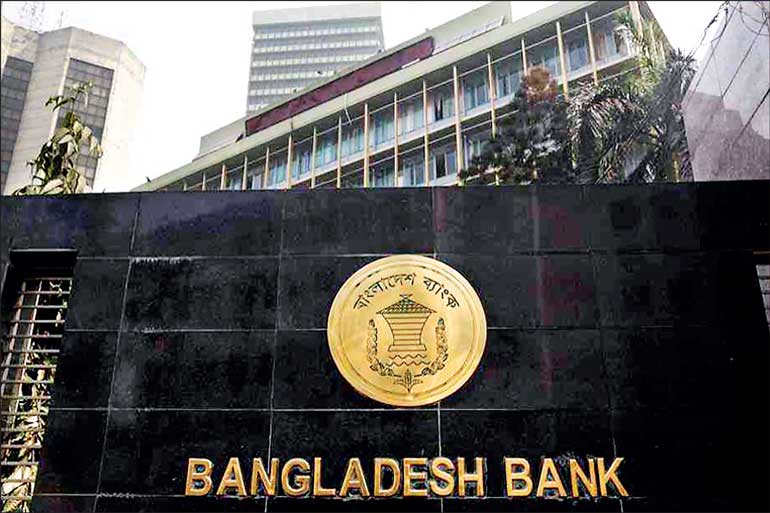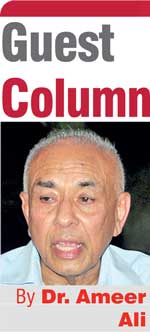Wednesday Feb 18, 2026
Wednesday Feb 18, 2026
Monday, 7 June 2021 00:00 - - {{hitsCtrl.values.hits}}

The currency swap deal with Bangladesh is of historic significance
CBSL will swap by the end of July this year, 49.5 billion of its depreciated rupee equivalent to $ 250 million, with Bangladesh Bank. Lending and borrowing are part of ordinary life, whether for an individual, institution or country, and there is nothing shameful about currency swaps, which in other words are a type of loan.
currency swaps, which in other words are a type of loan.
Earlier, Sri Lanka had similar swaps for much larger amounts with India and China. The one with India was reported to have been settled, while the one with China is not yet, and whether it would be eventually converted into a medium or long-term loan, given the predatory benevolence of China, also remains a strong possibility. If so, it will come at a higher price. However, the currency swap deal with Bangladesh is of historic significance for two important reasons.
Firstly, the fact that Bangladesh has become a lending nation for the first time in its 40-year history as an independent nation, is a reflection of its proud record of economic transformation. Having been discriminated, exploited and ill-treated by the government of a disjointed Pakistan since 1947, Bangladesh, when it achieved independence after the savagery of the Pakistani army in 1971, emerged as a textbook case of Third World poverty and underdevelopment. The country was buried under a ‘poverty curtain’, a title used to describe such economies by the Pakistani economist, Mahbub Ul Haq.
In contrast, Sri Lanka, when gifted with independence in 1948, popped out as one of the richer and economically promising nations, second in rank only to Japan in Asia. After 40 years of prudent management of its economy, Bangladesh, with $ 45 billion in its coffers has now become a lender to Sri Lanka which, through profligacy, squander, corruption and mismanagement of natural resources has allowed its foreign reserves dwindle to mere $ 4.5 billion almost equivalent to the country’s debt repayment obligations for this year.
Sri Lanka has been demoted already by the World Bank to a low middle income country and downgraded by several international lending institutions as less credit worthy. Given this contrasting performance between the two countries, the currency swap between taka and rupee represents a deal between pride and shame.
Secondly, the taka-rupee currency swap, like the one with India, also reflects the willingness of members of the South Asian Association of Regional Co-operation (SAARC) to help each other in times of economic difficulties. At the same time, it is also, in a sense, a slap at India by Sri Lanka for not forthcoming to facilitate Prime Minister Mahinda Rajapaksa’s telephone request for another currency swap of $ 1.1 billion, to which PM Modi had initially agreed in principle. However, Sri Lanka’s current foreign policy strategy of playing one against the other between China and India and expecting to maximise benefits from both the regional giants has obviously earned the wrath of New Delhi. How India is going to react is not yet clear.
Be that as it may, it is a long-term suicidal path for Sri Lanka to go on begging for more loans to settle the ones already incurred. True, COVID-19 has compounded the country’s economic difficulties, but so too in other countries. According to President GR’s advisors, he is said to be leading the economy along an ‘alternate path’ without publicly spelling out the details of that path. So far none of his advisors, including the Governor of Central Bank, has shown the blueprint of this path or model.
Sudden import bans in the name of self-sufficiency reflect more of the President’s thought bubbles than any systemic economic strategy.
They have created difficulties for consumers as well as producers. The Chinese-built Colombo Port City is now being advertised by ministers as a one-stop financial hub and a turning point in the country’s economic development. In all probability this city will become another Hambantota and almost a no-go economic zone for most Sri Lankans.
In the meantime, there is total policy confusion regarding the management and control of the raging virus. The President’s rabid reluctance to receive advice from professional experts and his dependence on politicised henchmen/women for policy directions in this area are destined to increase the number of COVID victims and deaths in days to come. His readiness not to allow the economy to collapse because of the pandemic and willingness to take unpopular decisions, though has economic and political rationale, yet they should not come at the expense of liberal democratic and humanitarian values.
In the absence of those values such pronouncements only reflect a ruler’s despotic aspirations and an unpreparedness to accept his or her un-infallibility. This is the current predilection of GR which is manifested in the multiple problems facing the nation. No currency swap can overcome this.
(The writer is attached to the School of Business and Governance, Murdoch University, Western Australia.)